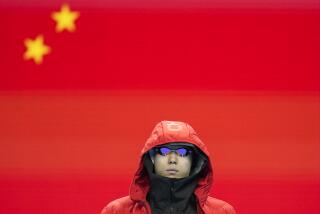Suspicions of French Gain Validation
- Share via
PARIS — From the leadership of the Tour de France to Parisian sporting goods stores, the reaction to the news about Floyd Landis’ drug test mixed sadness, disgust and an I-told-you-so tone of triumph.
“I am so disappointed,” said Fabrice Pradon, 34, who was about to buy a bike helmet at the Decathlon sporting goods store off the Place de la Madeleine in central Paris. “I thought doping problems were over when the leaders were kicked out of the Tour. I had hoped the Tour was going to surprise us without being polluted by these doping problems. The races in the place Pyrenees were great. Today you tell me Landis is suspected of doping, it makes me sick of professional cycling.”
But down the aisle, Pierre Frederic Berte, 25, said it reinforced French suspicions about doping and corruption among American bikers. Many French fans and journalists have accused Lance Armstrong of using performance-enhancing drugs during his seven-year domination of the Tour.
“Given that Armstrong has a similar record, I hope Americans are going to evaluate what happened and change the way they prepare themselves,” Berte said. “I wish they understood that a victory without doping is more natural and that it is real sports.”
The director of the Tour de France said Thursday that he wanted to await confirmation. But then he discussed his war against doping in the Tour.
“We must await the results of the [second drug test], but if it’s confirmed, there is a reaction of sadness,” said Christian Prudhomme. “We are ready to fight. We had told ourselves we had won a battle, but not the war.... There will still be difficult moments to endure. But this proves that the vice is tightening. Our will is intact. You’d have to be crazy to keep cheating.”
Back on the streets, a cycling enthusiast said the system was rotten beyond repair.
“I think the system is decadent so cyclists are decadent too,” said Philippe Lameya, 31. “I think they have no choice. Sponsors are on their back. They have no choice. If you want to win, if you want to be famous, you must be better than your neighbor. Your neighbor may be doped so you must do the same. No choice, if it’s on TV, it’s dead. I think that when there is broadcasting, there is money. Athletes become commercial products. There are no ethics anymore.”
More to Read
Sign up for Essential California
The most important California stories and recommendations in your inbox every morning.
You may occasionally receive promotional content from the Los Angeles Times.













